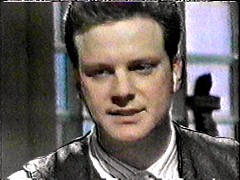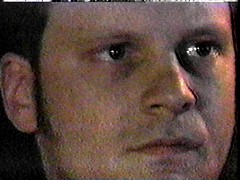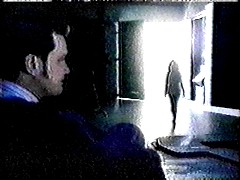![[Alan's look - and the braces]](bluepix/oblook.jpg)
![[Alan's look - and the braces]](bluepix/oblook.jpg)
FILM FACTS
PLOT SUMMARY
GENERAL COMMENTS
COLIN'S COMIC SKILLS
TRIVIA
FAVOURITE QUOTES
FURTHER DISCUSSION
WEB LINKS
CREDITS
- Title: Out of the Blue
- Year: 1991
- Company: BBC Television
- Running time: 80 minutes
- Colin's character: Alan (the principal character)
- Other cast: John Lynch (Rudy), Cathy Tyson (Julie), Catherine Zeta Jones (Chirsty), Dexter Fletcher (Anthony), Wendy Morgan (Liz), Jonathan Kydd (Neil), Dominique Atkins (Angelique), Bill Cashmore (Phil), Tina Deen (Amanda), Daniel Strauss (Chef)
- Producer: Barry Hanson
- Designer: Gavin Davies
- Writer: Graham Alborough
- Director: Nick Hamm
Out of the Blue is a satire which lays bare the absurd pretensions of a video maker's world. Colin plays Alan, an aspiring director, who apparently cannot separate art from life, with unfortunate consequences. His claim to fame: "he invented the title sequence for the trendiest arts review programme ever invented". From its bright and breezy Roy Lichtenstein-inspired pop cartoon title credits to its quieter conclusion (to the strains of "Blue Moon"), this made-for-TV drama is lively and entertaining.
Much of the action takes place in a warehouse/studio which is also Alan's flat. The play opens on a phone conversation in which Alan, observed by his easy-going art director Rudy, is attempting to do some wheeler-dealing, to get financial backing for his latest pop video, which he claims he is doing simply for "love and art". If we were in any doubt that this is a comedy, confirmation comes quickly when Alan casually lists the 'one or two little things' he needs to get going on his project, starting with a camera. His film of Angelique singing is a pastiche of arty video music clips - all flying feathers and sticky red paint against a white backdrop. As Rudy explains very clearly to Chirsty, "he's a film director - he talks shit sometimes. It comes with the territory".
A keynote for the story to follow takes place during an inebriated conversation in a cafe near the start of the play:
ALAN: It's to do with age maybe. There's a certain time when everything is new and rich and exciting, and yet people - you just - and people - uh - feel things more. You live more fully because you just - do things. For no reason. Big things - happen to them. They feel big things. Those are the sorts of moments I want for this. They're sort of luminous. They show up on film.
RUDY: They don't show up on film. They only happen on film. They don't happen in life. You can make them happen. You can make anything happen with that editing machine of yours. Films are easy. Christ, this is life here.
ALAN: No they do. They happen when you're that age. People feel big things. Big things happen.
![[Alan looks at the world]](bluepix/cflook.jpg)
And yet when a 'real' event occurs in the cafe - Rudy and Julie have a public fight in which they throw food and drink all over each other - Alan looks away, because this is too real and 'unartistic' for him.
Alan first sees Chirsty when she turns up to quietly watch the filming - and significantly, he first views her through the camera lens. Already, his view of her is coloured by the image she creates. He meets her when a recalcitrant mouse refuses to come out of its box and be filmed, and he is immediately charmed by her beauty, youth and ingenuous outlook on life. He asks if he might film her for a video title sequence.
Colin plays Alan as a man whose mind runs ahead of his mouth's ability to keep up. He is sometimes almost inarticulate, except when discussing video and film images. We soon learn that life experience is something he sees only in terms of its possibilities as art - he translates everything into camera images, and editing possibilities:
It's like magic. Just these buttons, the whole world's changed. I love it. I love the way you can control everything. Nice if you could do it in life. Life's a bit more tricky.
Immediately, he tries to take control of life by reshaping events - he spins different stories to Chirsty about how Rudy happened to lose the top of his index finger. When she drops off to sleep on his bed, he secretly films her, and that sense of voyeurism becomes the keynote to their relationship. When they have what Chirsty sees as a romantic day out, Alan sees it as a photo opportunity. He manipulates the discovery of a message in a bottle, to see how she will respond to it, and seduces her with romantic words that sound like he got them from a movie.
![[Chirsty sleeping]](bluepix/obsleep.jpg)
Even the audience is subject to Alan's manipulations - in one scene, Chirsty and Alan appear to be driving at night in the rain. But as the scene progresses, we learn that it is faked, with a stationary car set in Alan's studio, and sound and lighting effects.
As the story progresses, Chirsty learns the truth about Alan's manipulations, and ultimately she teaches him a lesson in real life.
After the disappointment of Valmont, Colin appears to have retreated for a while to the safety of television, theatre and relatively small film projects. Out of the Blue is one of a number of projects he has made for BBC TV. As he said at the BBC 60th Anniversary Awards ceremony in 1996 (where he won as 'Most Popular Male Actor'), BBC TV has "provided me with some of the greatest satisfaction I've ever had in terms of work."
Out of the Blue remains for me an utterly charming if a minor work. In this play, Colin gives us a young man who is completely driven by ambition and "art", completely self-centred, unable to come up with an original thought, but always re-working what others say, and very funny. This character is played for humour from start to finish. I heartily recommend it - there are some first rate actors in it, and it is a terrific little satire, held together by Colin. He has no fear of playing a character who loses his dignity (one of the core elements of comedy) - for example, the tiny sequence near the start when Colin (as Alan, the "arty" video clip director) calls for a retake of part of a song, and then stands there with the sound guy trying to identify the exact part of the song he wants to go from (they are both quite wonderfully foolish here).
If you haven't seen Out of the Blue yet, seek it out. Yes, it's a minor work, but it has many charms, not the least of which is Colin being utterly charming, wilful, self-centred, 'artistic', unable to express himself except through plagiarising the words of others, the object of humour, and very sexy indeed.
I always enjoy going back to this play - proof that Colin can do self-deprecating comedy really well. Also, his eyelashes are extraordinary - watch out for them in the final shots.
Out of the Blue features some of Colin's best kissing scenes - a lust-filled encounter across a restaurant table with Julie (Cathy Tyson), and several sexy and romantic sequences with Catherine Zeta Jones. ![[Kissing Chirsty]](bluepix/obkiss2.jpg)
I believe Colin is highly adept at playing comedy, though he plays 'truthful' comedy, which is much harder than mugging for the camera, etc. He plays comedy through characters which are perfectly observed, both for their foibles and human weaknesses as well as for their strengths. He plays flawed human beings. He chooses roles of this kind, and he is not afraid to be the object of humour. Other leading examples are his roles in The Advocate, Fever Pitch and Pride and Prejudice.
In my opinion, Out of the Blue is most definitely a comedy. It has all the hallmarks thereof. It is a parody/satire in which all the characters, however subtly they may be represented, are targets of one kind or another. Colin proves himself a very able comedian in this lightweight but entertaining piece. He gets the 'arty' director down pat: "Okay, don't forget your face, we're coming in tight - expressions and everything". As a comic creation, Alan is very, very funny without once being played for laughs.

An extraordinary number of Colin's fellow cast members in Out of the Blue have achieved significant success as actors on the big screen:
In the rowing boat:
CHRISTY: Move your tongue.
ALAN: (After kiss) What was that for?
CHIRSTY It's best.
On the island:
CHIRSTY: "I can do magic. I can blow out the moon! Watch! "
Island seduction scene (shades of Valmont):
ALAN: You know, we could do anything we ever wanted here. Our own little island. Anything. We could take off our clothes and lie in the rain. We could listen to the sound of the leaves, moonbathing in the quiet dark. Warm foggy blanket. And your eyes will be like cobwebs after a shower. And your breath will be as soft as one o'clock on a dandelion clock.
CHIRSTY: What was that noise?
ALAN: It was just the ducks talking to themselves under their wings in their sleep.
CHIRSTY: No, really.
ALAN: I dunno. It's - something somewhere. Maybe an animal. You really are afraid of the dark, aren't you.
CHIRSTY: Hold my hand. It's best.
ALAN: You know Chirsty, I just want you to know that I think it's a real thing happening here, you and me. That it's not just - that I really respect you.
CHIRSTY: Stop talking.
Two mouse scenes:
(1) ALAN: Let me through, I speak fluent mouse.
![[Alan and rodent friend]](bluepix/obmouse.jpg)
ALAN: Tell her if I don't here from her the mouse gets it. She can expect a tail in the post. [Hangs up. To mouse.] I didn't mean it. Go on, say it. Do I have to screw up every chance I get? Hmmm?
The first time he looks at Chirsty is through the lens of the camera. And the best of their relationship is in that form. Image, surface. What can be cut and remade? Can he have a real relationship with a flesh and blood woman? When she falls asleep on his bed (thus ruining his first attempt at remaking the story of Rudy's finger), his filming of her sleeping form is very sexual, invasive, reprehensible. It's the nearest he gets to rape. He even breathes heavily, as he does when he is aroused elsewhere. When I look at this scene coldly, I can best understand Chirsty's negative response to it. He really has taken something from her.
![[Alan's invasive camera]](bluepix/obwatch.jpg)
Alan plays with romance, but it isn't him - he's really a cynic who would like to steal back that innocent view of the world that Chirsty has. She engages directly with the world around her, takes pleasure in her body and in natural things (blowing out the moon). He is always one step removed, planning, shaping, manipulating her response. He orchestrates the message in the bottle. He gets his kicks not from being with Chirsty, but from how he can remake the event on the editing machine. It's better than sex. And it gives him all the control. "I love the way you can control everything. Be nice if we could do it with life, but life's a bit more tricky". Another telling moment occurs after Chirsty walks out when Rudy tells her how his finger was really lost. Alan says. "Cut. Can we go again on that one? Little bit of a hair in the gate."
Alan's lack of interior lifeHe is often surprisingly inarticulate. It's endearing, and funny, and satiric, that he expresses himself, when unprepared, in cliche and imprecise ramblings. "Now don't forget - we're coming in tight on your face, so expressions and everything" is not the most useful directorial comment. But he gets away with it. Or when he tries to describe Chirsty to Rudy: "You haven't met her - she's - she's - wonderful - she's so - she's just so -" He hasn't got a handle on how best to reconstruct it yet! He takes things people say to him, borrows them, stores them up, replays them, just like the video clips he is endlessly working on. He reworks images, most notably the loss of Rudy's finger. He tries out other realities and points of view, because he is rudderless himself.
Chirsty doesn't play the games he is familiar and comfortable with. She believes with all her heart and soul, responds directly to experience, cries, laughs, engages with her emotions. He doesn't know how to deal with that. "Everything's so simple with her, nothing gets in the way". But does he really want that? And if he learns anything by the end, it is that he can't expect to forge a real relationship on the basis that he conducts every part of his life - one step removed from reality. When they are on the island, he says some beautiful seductive things, but I'll bet you he is quoting something he has heard and seen (and probably used to good effect) before. He is playacting the romantic lead - it's in his voice. ". . . We can go bathing in the quiet dark . . . warm foggy blanket. And your eyes will be like cobwebs after a shower, and your breath will be as soft as one o'clock on a dandelion clock." And it works, but she hears a noise, and when he is confronted with her fear, which breaks the seductive routine, he can only come up with "Oh I dunno, it's an animal of some kind". He really is a calculating little devil, bankrupt of genuine responses.
![[Rudy]](bluepix/obrudy.jpg)
Rudy's view
Chirsty and the mouse are closely related. Rudy draws the analogy very specifically for us. But Chirsty ends up being the winner, the strong one. As the mouse is, come to think of it, since it is the mouse 'country & western' footage that is bought by the film company. An irony for Alan, since it is stated that they can do what they like with the footage, and he will lose his artistic control over it, just as he is about to do with Chirsty. There's a cute scene with Alan and the mouse, on the phone to Chirsty's flatmate. He can't have her, but he can be 'honest' about the mouse. Interesting that he reconstructs things even here - we clearly hear the flatmate hanging up, and following that, he says, "Tell her if I don't hear from her, the mouse gets it". Playacting. Remaking the scene the way it should have gone.Why does Rudy react so strongly to learning that Alan has been spinning yarns about his finger? because it is a real part of him that he has lost. Something he can't ignore, a real event, a real loss. "I wish you'd stop using my life as your own personal bloody chat up line . . . you click your fingers, I lose mine . . This is planet earth calling Alan".
Alan as voyeur
Personally, I loved the film of Chirsty cut to "Blue Moon". Very artistic. But it shows Alan as the ultimate voyeur on life, not a participant. A typical example of the male gaze behind the camera lens, with the female as object of the gaze, objectifed as a form to be admired, not a flesh and blood woman to be loved. He has to manufacture feeling. On the other hand, Chirstie rises above it, is natural. She has a love affair with the camera lens. It's a significant moment when Alan consigns that tape to the rubbish bin. What an action! But it's too late - the damage is done.
VISIT MY OVERVIEW OF COLIN'S CAREER & MY WEB PAGE
CHECK THE INTERNET MOVIE DATA BASE (Imdb) LISTING FOR OUT OF THE BLUE
VISIT THE ORIGINAL FRIENDS OF FIRTH WEBSITE, which now incorporates the CIRCLE OF FRIENDS web ring
Visit Lisbeth's Out of the Blue web pageVISIT JANE'S ARTICLES PAGE
It is part of a Firthland project on the films of Colin Firth.
